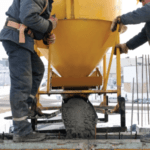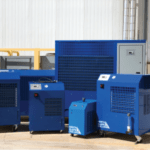Concrete cooling during peak summer heat requires planning, site preparation and some changes in methodology. Hot weather poses many risks to the quality of your finished slab. So how do you maximize the productivity of summer construction projects, without succumbing to the heat?
Concrete Temperatures
A strong concrete cure occurs around 60° F. When temperatures climb into the high 70s, crews need to have temperature control measures already in place to protect their slab. If left unchecked, your concrete temperatures will continue to rise. Concrete temperatures should never be allowed to rise to 90° F.
Hydration
Your slab becomes set during the hydration process, when water is absorbed and crystals are formed. Warmer concrete spends less time hydrating and has less time for these crystals to form and strengthen. The hydration of concrete curing is an exothermic process. This means as soon as water is introduced into a mixture, it will start to generate its own heat. On a cold day, this exothermic process works in your favor and helps keep your concrete warm during curing. However, during hot weather conditions, you and your crew are now faced with multiple heat sources to contend with.
A Hot Mess
Because hot concrete sets quicker, it has less time to strengthen. This time crunch can lead to structural as well as aesthetic defects. Hot concrete is prone to shrinkage and surface cracking. Crews also have less time to level, smooth, and set control joints.
Keeping Concrete Cool
There are multiple preventative methods that will help you keep your concrete cool when the heat is on.
Cold Storage
Keeping your aggregates and admixtures cool before they get mixed will help you start off right. During peak summer months, you will need more than just shade to keep your products cool. Consider using cooling jackets around storage containers to pre-chill all your concrete components before you even begin to mix.
Chill Your Water
Chilled water can reduce concrete temperature by up to 10° F. For larger slabs, you will need more than just a bag of ice to chill enough water for your mix. Having an industrial chiller on hand to chill your water before mixing will give you a great advantage over mother nature.
Cool Your Sub-grade
Now that all of your pre-chilled components are mixed, it is time to pour. Pouring your nice cool concrete onto a piping hot sub-grade will immediately undo all of your cooling prep work. Lightly spray down (but do not saturate) your sub-grade with chilled water to keep your pour site nice and cool.
Time Your Pour
During hot conditions, pours should be scheduled during the coolest part of the day. Most likely this time frame will fall in the morning hours. If your concrete is being mixed off-site and then delivered, make sure you avoid timing your deliveries during peak heat.
Cooling Blankets
Just as dark colors absorb heat, light colors reflect heat. Using a white protective barrier over your concrete as it sets will help keep it cooler during the hydration process and minimize moisture loss. For extra cooling power on extremely hot days, the same cooling jackets that pre-chilled your aggregates and admixtures can be placed in direct contact with your slab.
Powerblanket Concrete Cooling Solutions
Powerblanket specializes in total temperature control. We can help you beat the heat, stay on schedule, and avoid costly repairs and re-pours. Our portable process cooling solutions and Fluxwrap cooling jackets are easy to use all over your job site to keep your water, admixtures, aggregates, and slabs cool on hot days. Contact us to find the perfect concrete cooling solutions for your needs at 855.900.1693 or [email protected].
Keep your products and processes within the desired temperature range with Powerblanket's industrial cooling solutions.





